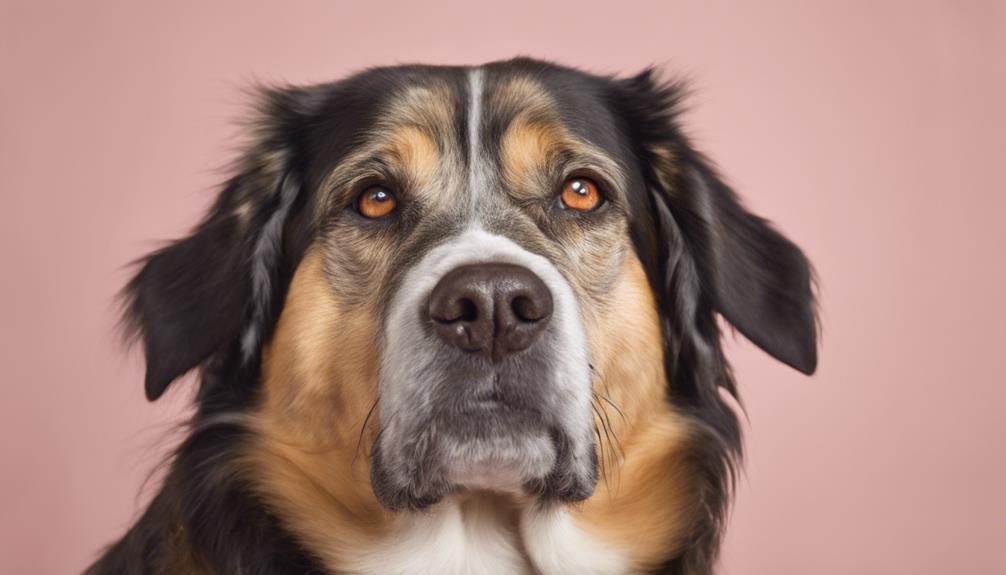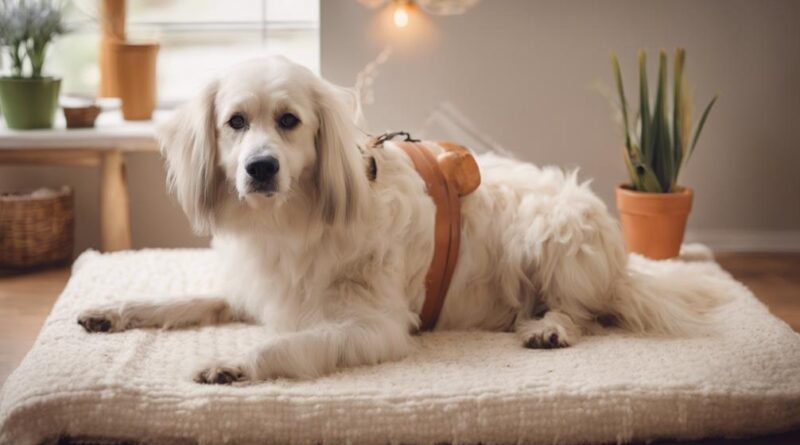Five Essential Tips for Senior Dog Care
Imagine the gentle greying muzzle of your loyal companion, their eyes reflecting years of shared memories. As your senior dog ages, their care requirements evolve. From tailored nutrition and regular vet visits to ensuring their comfort and mental stimulation, there are key strategies to enhance their quality of life.
But what are the essential tips that can make a real difference in your senior dog's well-being? Let's explore practical advice to help you provide the best care for your aging furry friend.
Understanding Senior Dog Needs
To properly care for your senior dog, you must understand their evolving needs as they age. Two critical aspects to consider are mobility support and cognitive decline. As dogs grow older, they may experience issues with their mobility, such as arthritis or joint stiffness. Providing them with a comfortable and supportive bed, gentle exercise routines, and possibly even supplements recommended by your vet can help improve their mobility and overall quality of life.
Moreover, cognitive decline is also a common issue in senior dogs. You may notice signs like disorientation, changes in sleep patterns, or decreased interaction. To support your dog through this, maintaining a routine, incorporating mental stimulation activities, and ensuring a peaceful environment can be beneficial. Additionally, consider enrichment toys or puzzles to keep their minds active.
Understanding and addressing these evolving needs are crucial in providing the best care for your senior dog, ensuring they remain comfortable, happy, and healthy in their golden years.
Diet and Nutrition Tips
Understanding your senior dog's evolving needs includes ensuring their diet and nutrition are tailored to support their health and well-being as they age. Here are some essential diet and nutrition tips to keep in mind:
- Weight Management: As dogs age, they may become less active, leading to weight gain. Adjusting their diet to manage weight is crucial to prevent health issues such as arthritis and diabetes. Consult your vet for recommendations on portion control and suitable low-calorie foods.
- Protein Requirements: Senior dogs often require higher levels of easily digestible proteins to maintain muscle mass and overall health. Look for quality protein sources like lean meats, fish, and eggs in their diet. However, it's essential to consult the vet to ensure the protein levels are appropriate for your dog's specific needs.
- Nutrient-Rich Diet: Provide a balanced diet rich in essential nutrients like vitamins, minerals, and antioxidants to support your senior dog's immune system, joint health, and cognitive function. Consider switching to senior-specific dog food formulas tailored to meet their changing nutritional requirements.
Exercise and Mental Stimulation
Ensure your senior dog stays active and engaged by incorporating regular exercise routines and mental stimulation activities into their daily schedule. Interactive toys are a fantastic way to keep your senior pup's mind sharp and provide physical activity. Toys that dispense treats or require problem-solving can help stimulate their cognitive abilities while keeping them physically active. Additionally, taking your senior dog to a senior dog park can be a great way for them to socialize, exercise, and engage with other dogs their age. These parks often have special amenities tailored to the needs of older dogs, such as gentle walking paths and senior-friendly agility equipment.
Regular walks tailored to your senior dog's energy levels are also important for maintaining their physical health. Shorter, more frequent walks can be beneficial for older dogs who may not have the stamina for long outings. Remember to adjust the intensity and duration of exercise based on your dog's individual needs and consult with your veterinarian if you have any concerns about their exercise routine.
Regular Veterinary Check-ups
Regular veterinary check-ups are essential for monitoring your senior dog's health and addressing any potential issues early on. These routine visits are crucial for providing preventative care and ensuring your furry companion's wellness throughout their golden years. Here are key reasons why regular veterinary check-ups are vital for your senior dog:
- Preventative Care: Regular check-ups allow the veterinarian to assess your senior dog's overall health, detect any early signs of illness, and recommend preventive measures such as vaccinations, parasite control, and dental care to keep your dog healthy and happy.
- Early Detection of Age-Related Conditions: Senior dogs are more prone to age-related conditions such as arthritis, dental issues, cognitive dysfunction, and cancer. Through regular check-ups, these conditions can be identified early, and appropriate treatment plans can be initiated promptly to manage or alleviate the symptoms, improving your dog's quality of life.
- Tailored Treatment Plans: With regular veterinary visits, your veterinarian can create personalized treatment plans that address your senior dog's specific health needs, including medication adjustments, dietary recommendations, and lifestyle modifications tailored to promote their overall well-being and comfort as they age.
Managing Senior Dog's Comfort
To ensure your senior dog's well-being as they age, focus on managing their comfort through tailored care and attention to their changing needs. Comfort techniques play a crucial role in enhancing the quality of life for senior dogs. Provide soft and supportive bedding to alleviate joint pain and make it easier for them to rest. Additionally, consider adjusting their diet to maintain a healthy weight and reduce strain on their joints.
As aging pets may experience mobility issues, incorporating mobility aids can significantly improve their comfort. Ramps or steps can assist them in reaching elevated areas without putting excessive pressure on their joints. Regular, gentle exercise can also help maintain their muscle strength and flexibility, contributing to their overall comfort and well-being.
Dental Care for Senior Dogs
Enhance your senior dog's comfort and overall well-being by prioritizing proper dental care to maintain their oral health in their later years. As dogs age, their oral hygiene becomes increasingly important to prevent dental issues that can impact their quality of life. Here are some essential tips for ensuring your senior dog's dental health:
- Regular Oral Hygiene Maintenance: Just like humans, senior dogs benefit from regular teeth cleaning. Brushing your dog's teeth with a toothbrush designed for senior dogs can help prevent plaque buildup and maintain healthy gums.
- Provide Dental Treats: Dental treats specially formulated for senior dogs can aid in keeping their teeth clean. These treats can help reduce plaque and freshen your dog's breath while providing them with a tasty snack.
- Monitor Gum Health: Keep an eye on your senior dog's gum health. Look out for signs of inflammation, bleeding, or bad breath, as these could indicate underlying dental issues that require veterinary attention. Regular check-ups with your vet can help ensure your dog's gums stay healthy.
Recognizing Signs of Pain

Maintain your senior dog's well-being by staying vigilant for signs of pain that may indicate underlying health issues. Identifying discomfort in older dogs can be challenging since they may not express pain as overtly as younger pups. Look for subtle changes in behavior such as increased irritability, decreased appetite, reluctance to move, excessive panting, or whining. If you notice any of these signs, it's essential to consult your veterinarian promptly to address the underlying cause.
When it comes to pain management techniques for senior dogs, there are various options available. Your vet may recommend medications, such as nonsteroidal anti-inflammatory drugs (NSAIDs), to help alleviate your dog's discomfort. Additionally, alternative therapies like acupuncture, physical therapy, or supplements such as glucosamine can also aid in pain relief. It's crucial to work closely with your veterinarian to develop a comprehensive pain management plan tailored to your senior dog's specific needs.
Quality Time and Affection
Spend quality time with your senior dog, showing them affection and attention to strengthen your bond and ensure their well-being. Bonding activities are crucial for maintaining a strong connection with your aging pup, providing emotional support and enhancing their quality of life.
Here are three ways to engage in meaningful interactions with your senior dog:
- Gentle Touch: Regularly petting and grooming your senior dog can be a soothing and comforting experience for them. This physical touch helps them feel loved and cared for, fostering a sense of security and happiness.
- Playtime: Engage in light play sessions that are suitable for your senior dog's age and physical condition. Interactive toys or gentle games like fetch can keep them mentally stimulated and strengthen the bond between you two.
- Quiet Time Together: Simply being present with your senior dog, whether cuddling on the couch or sitting together in the backyard, can provide a sense of companionship and reassurance. This quiet time allows for peaceful moments of connection and relaxation, promoting emotional well-being for both you and your furry companion.
Frequently Asked Questions
Can Senior Dogs Still Learn New Tricks or Commands?
Yes, senior dogs can still learn new tricks or commands. Providing cognitive stimulation and using positive reinforcement techniques can help them grasp new skills.
By engaging their minds and rewarding their efforts, you can encourage learning at any age. Remember, patience and consistency are key when teaching senior dogs.
With the right approach, they can continue to learn and enjoy mental challenges throughout their golden years.
How Can I Help My Senior Dog Adjust to Changes in Their Environment?
To help your senior dog adjust to changes in their environment, focus on environmental enrichment and behavioral adjustments. Make gradual routine changes and provide comfort measures such as a cozy bed or familiar toys.
Spend quality time with your dog to reassure them and maintain a sense of security. Consistency and patience are key in helping your senior pup adapt to any new surroundings or situations.
Are There Specific Toys or Activities That Are Best for Senior Dogs?
For senior dogs, the best toys and activities focus on mental stimulation and gentle exercise. Puzzle toys that dispense treats can keep their minds sharp. Short walks or low-impact games help with physical health. Engaging in activities that cater to their age and abilities ensures they stay active and happy.
How Can I Prevent My Senior Dog From Feeling Lonely or Anxious When Left Alone?
To prevent your senior dog from feeling lonely or anxious when left alone, consider solutions for separation anxiety. Provide mental stimulation through enrichment activities like puzzle toys or treat-dispensing gadgets.
Additionally, establish a routine before leaving to create a sense of security. Leaving comforting items such as a favorite blanket or toy can also help ease your dog's anxiety.
Gradually increase alone time to build confidence and reduce feelings of loneliness.
What Are Some Common Behavioral Changes in Senior Dogs and How Can They Be Addressed?
As senior dogs age, they may experience cognitive decline, leading to behavioral changes like confusion or disorientation. To address this, consider providing mental enrichment activities to stimulate their mind.
Senior dog training can help tackle challenges such as accidents in the house or increased aggression. Remember to be patient and understanding as your furry companion navigates these changes in their golden years.
Conclusion
Now that you have learned the five essential tips for senior dog care, you can ensure your furry friend enjoys their golden years to the fullest.
Remember to provide a balanced diet, regular exercise, and plenty of love and attention.
By staying proactive with their health and well-being, you can help your senior dog live a happy and comfortable life.
Keep up the good work and cherish every moment with your loyal companion.
